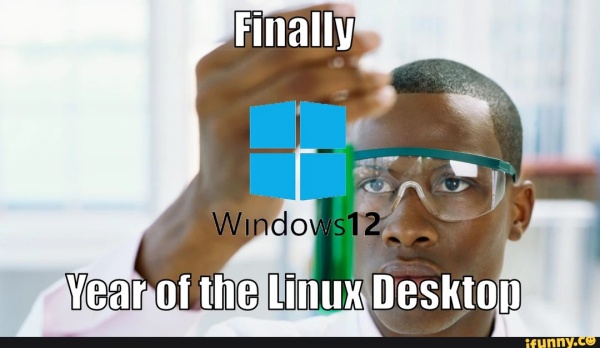How to make The Linux Desktop irrelevant
Just make it REAL popular… in the wrong way.
“The Year of the Linux Desktop”, would be the year when the Linux operating system becomes as popular and ubiquitous as a desktop operating system as Microsoft Windows has been for decades.
A 2018 opinion piece titled “Could Microsoft release a desktop Linux?, which I noticed only this week, makes an excellent job to explain, albeit implicitly, why such an event would accomplish nothing substantial for the Free/Open Source Software movement of which Linux is the biggest success story.
The reason is that if Microsoft did release its own version of Linux for desktop computers, it would be a big success because Microsoft would surely guarantee two things:

First, “Microsoft could, without too much trouble, make it possible for [Windows applications] to keep running on Linux without major changes”.
Second, and most important, “with many applications, no change at all will be needed. For example, Office 365 now brings Microsoft more cash than MS-Office. With Microsoft doing all it can to get customers to move to cloud-based apps from shrink-wrapped programs, the underlying desktop operating system loses its importance."
In other words, everybody would be running Linux because it would not matter anymore: today’s users of Microsoft Windows would continue to use proprietary software that would continue to lock their documents into secret formats, that would force them to keep using that software, and or in somebody else’s cloud.
But it would be in the Year of the Linux Desktop, so it would be good, of course:

Who writes this, why, and how to help
I am Marco Fioretti, tech writer and aspiring polymath doing human-digital research and popularization.
I do it because YOUR civil rights and the quality of YOUR life depend every year more on how software is used AROUND you.
To this end, I have already shared more than a million words on this blog, without any paywall or user tracking, and am sharing the next million through a newsletter, also without any paywall.
The more direct support I get, the more I can continue to inform for free parents, teachers, decision makers, and everybody else who should know more stuff like this. You can support me with paid subscriptions to my newsletter, donations via PayPal (mfioretti@nexaima.net) or LiberaPay, or in any of the other ways listed here.THANKS for your support!